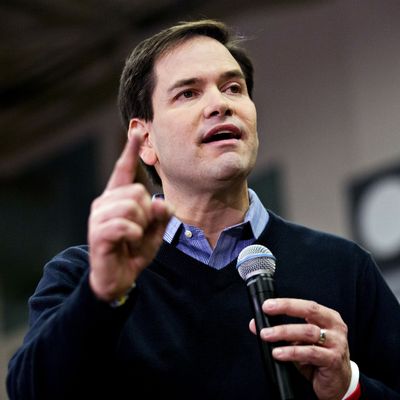
The Tax Policy Center released on Thursday its analysis of Marco Rubio’s ginormous-tax-cut plan. The figures are pretty staggering. Once fully in effect, Rubio’s plan would increase the budget deficit by almost a trillion dollars a year. Rubio’s tax cuts would overwhelmingly accrue to the rich. The highest-earning one percent would take home 40 percent of the benefit. The lowest-earning two-fifths of the country would see its income rise just over one percent from the Rubio tax cuts, while the richest one percent would see its income rise by almost 9 percent:
Naturally, Rubio’s campaign is disputing the validity of these numbers. Lanhee Chen, a former Romney campaign adviser now working for Rubio, calls TPC biased for ignoring all of the bountiful economic growth Rubio’s tax cuts will unleash, and also the spending cuts that will combine to offset their cost:
“Plans to cut spending,” huh? I asked Chen where I could find a description of these spending cuts, and he pointed me to the issues page on Rubio’s website. There you can find the following proposals to cut spending:
Some of Marco’s ideas to get spending under control:
Fight for a Balanced Budget Amendment and force Washington to live within its means without raising taxes
Repeal ObamaCare and cut trillions in spending on the job-destroying law
Push for line-item veto authority to cut wasteful spending
Permanently ban pork-barrel earmarks
Reduce the size of the federal workforce in Washington
Prevent massive, irresponsible spending bills
Allow states to use wasteful federal funds to pay down the national debt
Oppose corporate welfare like the New Deal-era Export-Import Bank
Reform budget rules to provide taxpayers with the true costs of government spending and the benefits of pro-growth policies
Reform and save Medicare and Social Security for future generations without impacting those in or near retirement
Some of these proposals merely describe ambitions to cut spending (“Fight for a Balanced Budget Amendment and force Washington to live within its means without raising taxes … Push for line-item veto authority to cut wasteful spending … Prevent massive, irresponsible spending bills”). Some of them are insignificant costs (“Oppose corporate welfare like the New Deal-era Export-Import Bank” — which costs $2 billion over a decade, a trivial sum). The rest are undefined ambitions without concrete policies Rubio cares to defend, like reducing unspecified federal jobs or cutting future spending on Medicare and Social Security — but (Rubio’s site assures us elsewhere) “Making no changes for those in or near retirement,” which means no savings could be found in these programs in the near future.
And there’s repealing Obamacare. That would increase the deficit, too. Now, the cost of repealing the tax hikes that help pay for that law is already included in Rubio’s budget, so we can give Rubio some credit here — there are savings to be found by yanking health insurance away from the 19 million people who have gained it through the Affordable Care Act. On the other hand, Rubio’s list of budget promises does not mention his plans to jack up defense spending by about a trillion dollars over a decade.
So, in total, Rubio promises an enormous tax cut, higher defense spending, no changes to Medicare or Social Security over the next decade, and a balanced budget. All of those promises are necessary commitments one must make to be the candidate of the Republican Establishment, as Rubio hopes to be. But because these promises are so impossible, he can’t accept the legitimacy of standard budget accounting and must rely on fantasy promises of massive economic growth, even though neither standard economics nor the history of the last 25 years provides much reason to believe debt-financed tax cuts do anything at all to increase economic growth. (Some studies suggest debt-financed tax cuts like those enacted under the Bush administration slightly reduced economic growth, if anything.) Rubio can either follow sane budget accounting principles, or he can make himself acceptable to Republican elites. He’s chosen the latter.






























